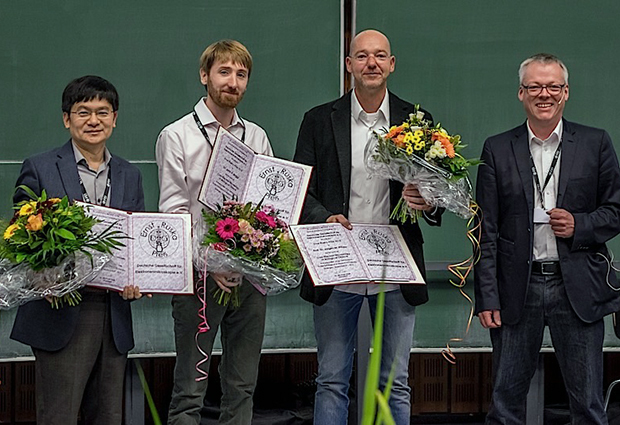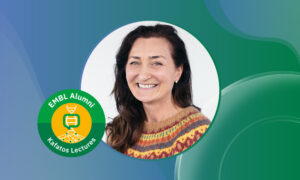
Awards & Honours

This year’s Ernst Ruska Prize, awarded by the German Society for Electron Microscopy, has been presented to EMBL Heidelberg group leader John Briggs. Named for the German physicist and Nobel laureate who designed the first electron microscope, the prize was jointly awarded to Briggs and Jürgen Plitzko of the Max Planck Institute of Biochemistry at the opening ceremony of the Microscopy Conference 2015 in September, in “recognition of contributions to cryo-electron microscopy of biological objects”.
Eric Karsenti, founder of EMBL’s Cell Biology and Biophysics Unit and currently a visiting scientist, has been awarded one of France’s highest scientific distinctions: the CNRS Gold Medal. “I feel very proud and grateful to have been selected by my peers to receive this award,” says Karsenti. “However, I share it with all the excellent scientists from all fields who contributed to the projects I led: without their work and expertise nothing would have been possible.” The award celebrates his exceptional career, marked by significant breakthroughs, pioneering interdisciplinary approaches, and efforts to push back the frontiers of knowledge as initiator of the Tara Oceans expedition.
Head of EMBL Hamburg Matthias Wilmanns has been appointed professor of Biomedical Structural Biology at the Department of Medicine at the Universitätsklinikum Hamburg-Eppendorf (UKE). “I am very honoured to have been granted this professorship,” says Wilmanns. “It is our hope and expectation that this appointment will reinforce the already successful cooperation between the UKE and EMBL, and help explore opportunities in structural biology research with important themes in molecular medicine.” This appointment follows the signing of a cooperation agreement by the UKE and EMBL in April 2014, and the establishment of a joint PhD training programme.
Edward Lemke, group leader at EMBL Heidelberg, has been awarded a Young Chemical Biologist Award by the International Chemical Biology Society (ICBS). The award recognises the accomplishments of young investigators who have made ground-breaking contributions to chemical biology. Awardees give a presentation during a special ‘Rising Stars’ session at the annual meeting, which this year took place in Berlin, 7–9 October.
Jan Korbel, group leader at EMBL Heidelberg, has been elected to the German Academy of Sciences Leopoldina, becoming the youngest member in the life sciences area. Founded in 1652, the Leopoldina is one of the world’s oldest academies of science, with some 1500 members that represent world-leading scientists from across the globe. New members are invited to present a lecture at the official inauguration ceremony in May 2016. “It is a huge honour to be elected to the Leopoldina,” says Korbel, whose election recognises his scientific achievements as well as his involvement with the ethical and legal self-regulation of science.


